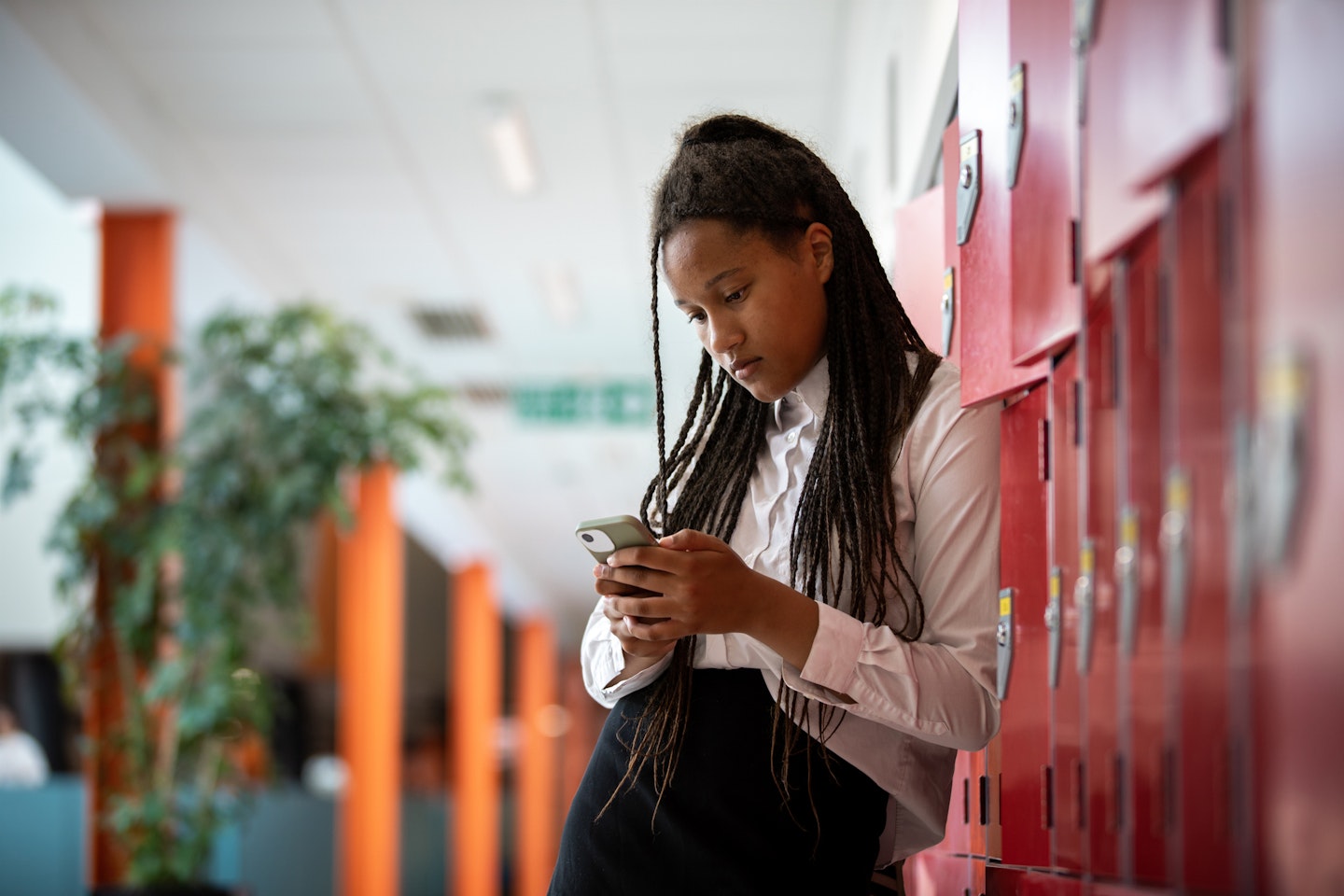As parents you are bound to worry about ways to protect your kids from social media. It's normal to ask questions like, How do I keep my kids safe online? What age should I speak to my child about keeping safe online? How do I keep up with the ever-changing world?
While the internet has shaped and introduced new opportunities to help children to study, play and connect, we know it also comes with some risks which depend on how safely and responsibly your child is when surfing the net.
The danger of online harm of course varies by age and what they are doing online. So, finding age-appropriate ways to teach your kids is very key, as it keeps them safe and helps them identify when to tell a parent, when they start to feel unsafe or uncomfortable.
According to Chelsea Hopkins, Social media and PR manager at fasthosts: "The internet is constantly changing, and for modern-day parents, the idea of introducing their children to the world wide web can feel daunting, and even scary at times."
"Although the near-unlimited access it provides to information and entertainment is vital in our daily lives, safeguarding kids as they enter the digital world is crucial for their wellbeing and development."
"With this in mind, the experts at fasthosts recommend a practical approach to online safety, where access to the internet isn’t restricted, but rather tailored to specific age groups. This approach empowers both kids and parents, helping both parties to enjoy the internet safely and responsibly."
An age-by-age guide to online safety for kids
With questions like how to keep your kids safe on Instagram, or maybe social media as a whole being of interest to many parents, Chelsea has broken down the age by age guide to online safety for your kids.
Preschool and nursery
Age: 0 - 5 years
It’s unlikely that your preschooler will have an internet-connected device that they have completely free access to, but they may have a ‘child’ version of a table, or borrow from parents or siblings. Below you’ll find the steps you can take to make sure your little one is using these devices safely:
Pre-research apps - Even if an app or website claims to be child-friendly, make sure you conduct your own independent research before installing and allowing your child to use it.
Supervise - Not all video content is what it seems to be. Make sure you can always see what your child is watching, even if it claims to be of a beloved TV character.
Set boundaries - Establish time limits and when your children can use these devices. There are often built-in features that can lock the device after a certain amount of time.
Educate - It’s never too early to start teaching about internet safety, so why not explore the digital world together, and include healthy concepts such as seeking advice and asking for permission?

Early school
Age: 5 - 6 years
As your child begins their school career, their access to the internet may change and expand. The below are some additional safety steps you can incorporate into the previous ones for a more rounded approach.
Continue to supervise - You may want to tweak the parental controls, but continue to practise close supervision and education around internet safety.
Be available - The internet can be a wonderful place, full of fun and excitement, but also educational. However, there can also be scary or upsetting things out there, so encourage your child to step away from their device and come to an adult they trust if they feel uncomfortable or sad.

Junior primary school
Age: 6 - 11 years
As kids become more independent, particularly when it comes to research and homework, their use of the internet will likely increase. They may also start to venture into the world of video-sharing platforms and social media.
Maintain supervision - Your children will want to be more autonomous at this age, but it’s still essential to keep an eye on what they get up to.
Safe browsing habits - Introduce the basics of safe internet usage - such as scams and shopping online - so they are aware of the risks to look out for.
Online etiquette - Ensure they know the importance of being kind and respectful to others on the internet, as well as stressing the importance of keeping private details private, especially anything to do with their identity and location.
Parental controls - Now may be the time when you think about reducing parental controls on devices. Accompany this lifting of restrictions with open and honest discussions around trust.

Early high school
Age: 11 - 13 years
High school is an important milestone in your kid’s online education, marking a move into adolescence where they are likely to spend a significant amount of time online.
Privacy settings: Encourage your children to be mindful about what they post online, and who they share it with. Look through the settings on any social media accounts they’re old enough to join and show them the importance of locking down their profiles.
Cyberbullying - Educate your child on the dangers of cyberbullying, and the potential it can have on themselves and those around them. Reiterate that they never have to give in to peer pressure or engage in online abuse. You should also educate yourself on the signs of cyberbullying, such as your child being withdrawn, hiding their devices, or giving up on hobbies.
Encourage communication - Create a safe space for open communication, let them know that if they ever come into contact with cyberbullying or become a victim of it themselves, to inform an adult.
Dangers of the internet - Encourage them to question the safety and credibility of the information and content they encounter online. Whether that be watching videos, or friend requests from strangers. Help them recognise the signs of legitimate websites as opposed to fake/misleading websites.

Late high school
Age: 13 - 16 years
As your child moves towards leaving high school, they’re likely on social media, or the internet will be a key part of their daily life at the very least. Kids in this age group will be using technology to communicate, create, learn, post content and socialise.
Online reputation - Ensure they understand the value of their online reputation – that everything on the internet is permanent - and emphasise how the decisions they make online now may impact their future.
Keeping things private - Encourage your children to think carefully before they post, especially regarding the information they release. Personal details - such as date of birth, location and address - should be kept private.
Responsibility - Encourage independence when it comes to technology and responsibility, and let them know that your door is always open. Remember to have regular check-ins about their experiences online.
Healthy habits - While you may not want to impose time limits, stress the importance of striking a healthy balance between being online and offline.

Is Roblox safe for kids?
"Roblox allows you to create and build your own minigames within the Roblox world, so while this is great for creativity and learning coding, it also means that almost anything goes when it comes to the contents of games created by others. There’s also the communication feature where players can talk to one another," explains Chelsea.
"As you can imagine, the latter can cause a fair few issues. The Roblox creators have Community Standards that outline what behaviour is and isn’t acceptable on the platform. They also have moderators who review and remove inappropriate content, and have a range of parental controls and safety settings that can help keep your child safer on the platform – one of which includes being able to build a list of age-appropriate games verified by yourself. Parents can also disable the chat feature or place restrictions on who they talk to."

Is TikTok safe for kids?
"You need to be at least 13 years old to create a TikTok account, and the profiles of those aged between 13 and 16 will automatically be set to private," says Chelsea. "However, there are steps that parents can take to make the app as safe as possible – as there is always a chance that kids will come across content that isn’t suitable. The ‘Family Pairing’ setting allows you to connect your child’s account to yours, and gives access to parental controls such as communication settings and time limits. Restricted mode helps to filter out videos that may contain adult or inappropriate topics and stop them from appearing on their ‘For You’ page, and comment filters can be applied."
Is Snapchat safe for kids?
"The age limit for Snapchat is also 13 years old and is mainly used for sending pictures and messages, so there’s a chance they could come across inappropriate messages or fall victim to cyberbullying. There are features and settings in place for parents to make Snapchat safer for their children."
"The ‘Family Centre’ gives parents an overview of their child’s activity on the app by linking their account to their child’s. Parents can see a list of friends and who they have spoken to in the last week. ‘Ghost mode’ will stop other users from seeing your child’s location. There are also base-level restrictions on adults connecting with children – adults won’t be able to add anyone under the age of 17 unless they have a certain number of friends in common", says Chelsea.
Mummy to a little girl, Adejumoke Ilori is Commercial Content Writer for Mother&Baby. With a BA hon in Creative Writing, she has worked for digital platforms, where she has empowered women from the inside and out, by sharing real life stories based on relationships and loving yourself.
Meet the expert
With over 13 years of experience in various marketing roles, Chelsea is a multi skilled professional specialising in social media and community building. She is currently the social media and PR manager at Fasthosts, a leading web hosting and cloud services provider.
